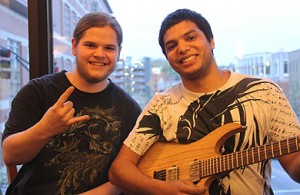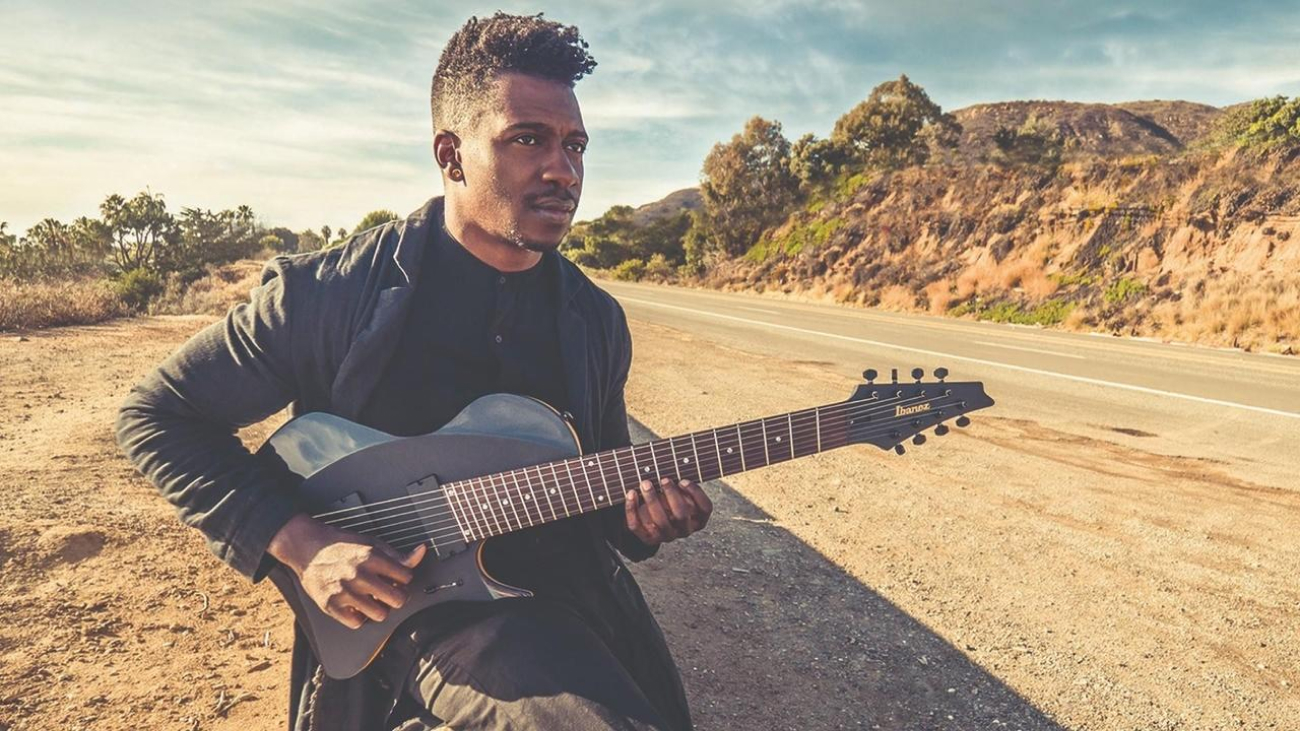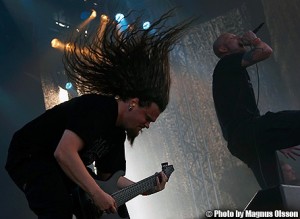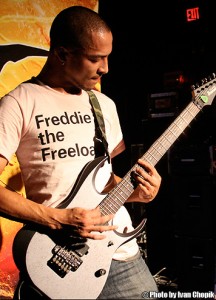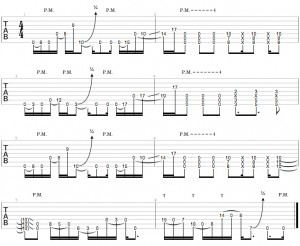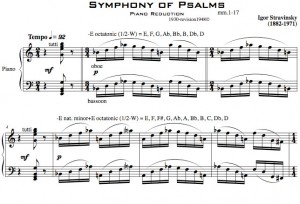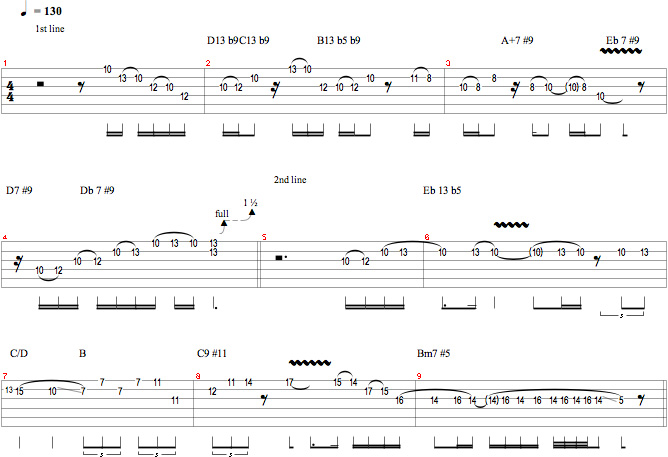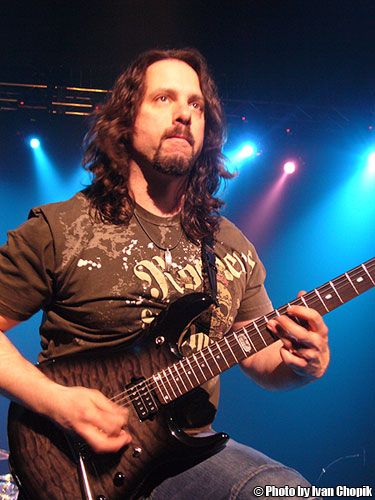 John Petrucci is one of the founding members of Dream Theater, arguably today’s biggest progressive metal band. He has come to be known as one of the world’s finest guitarists, exhibiting technical precision and control of the instrument, all the while providing intricate melodic lines that weave through a diverse catalogue of music – as is the nature of progressive metal.
John Petrucci is one of the founding members of Dream Theater, arguably today’s biggest progressive metal band. He has come to be known as one of the world’s finest guitarists, exhibiting technical precision and control of the instrument, all the while providing intricate melodic lines that weave through a diverse catalogue of music – as is the nature of progressive metal.
In addition to working with Dream Theater, the Berklee College of Music alumnus has also been involved with various outside projects, including the release of his solo debut, Suspended Animation, several albums with his acclaimed instrumental project, Liquid Tension Experiment, and a recent G3 tour with virtuosos Joe Satriani and Paul Gilbert. John is currently on a world tour in support of Dream Theater’s latest release, Systematic Chaos.
For more information on John Petrucci and his music, visit www.johnpetrucci.com.
IC: What’s going on right now in the world of John Petrucci?
JP: Well, right now I’m on tour with Dream Theater and that’s basically been consuming all of my time. We started a world tour in June; we’ve been to Europe, America, and Canada. We’re back in Europe now (in Glasgow, Scotland) and we will be going to Asia, Australia, and South America, and then back to the US in the spring. Basically, keeping busy with Dream Theater on tour.
IC: You recently announced a Liquid Tension Experiment reunion. How did that come about?
JP: You know, its something that kind of pops up every year. The people at NEARfest had asked Mike Portnoy [Drums] if any of us would be interested. He had been asked before; they must ask him every year. This year we said, “yeah, we will do it” (laughs), and it will be fun.
IC: What can the fans expect? Will there be a live DVD or maybe even LTE3?
JP: Basically, right now it’s just the show, so there are no plans to do another album. That would be nice, but like I said Dream Theater is going to be busy up until that time, since the show is in June and we will be touring right up until then. There really is no time to do one between now and then.
IC: If things were to work out in the future, is that something you would be up for?
JP: Yeah, sure! It was a fun thing to do. We kind of let it rest for a while. There are a lot of issues and problems with that record label and that kind of put a sour taste in all our mouths. But it’s always fun to play that music, its always fun to play with Tony [Levin, Bass]. Musically, it’s a good thing to do.
IC: I’ve heard before that there had been some problems with that label (Magna Carta). Would you mind elaborating a bit on what really happened there?
JP: It’s not really something I can talk about, legally. Let’s just leave it there – many problems [laughs].
IC: What are your plans for upcoming releases?
JP: I think first and foremost for me its time for another solo album, so I’m going to start working on that material. It will be a little tough to find the time to do that while Dream Theater is on tour, but it will certainly be my first order of business once we are done. Basically at this point, I’m going to start to compose and gather material to do another one. I think it will be nice… the first one was a lot of fun for me, and it’s been a couple of years now and the timing seems right.
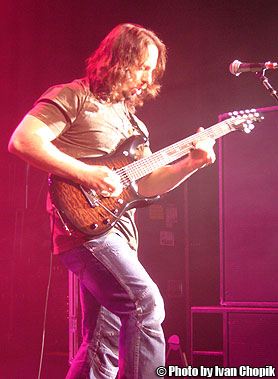 IC: Can you give us a time frame for the completion of the new record?
IC: Can you give us a time frame for the completion of the new record?
JP: You know what, I’d rather not give it, because I don’t want to offer false hope [laughs]. My future right now is very Dream Theater intensive, just because we have so much touring ahead of us. The tour will basically last for about a year. The type of writing, gathering material I’m talking about almost happens in between the cracks – whatever time you can find in between. It’s hard in that situation to give a definite time span.
IC: Speaking of your solo record, you released Suspended Animation on your own label. Looking back, was that a good decision?
JP: Yeah, I’m really happy with that decision. It’s something I thought about a lot and obviously there were a lot of different ways to go, a lot of different routes – I could have done it for a label, I could have licensed it, gotten distribution. But it’s kind of part of building my own identity and my little empire. It’s important to me, it’s important to my wife and I, and it’s the business that we run to gain credibility there. So, I’m really happy with it – it ended up doing very well. But, like we are talking about, I think it’s time for another one.
IC: While we’re on the business side of things, how would you say in general Dream Theater’s relationship with their label has changed since the recent switch to Roadrunner Records?
JP: Immediately we felt a difference. From the moment we delivered the record and the whole plan on how to release it, the lead up and build up to the album release – they have been way more involved and way more proactive. As a result, we charted in many countries, including in America, higher than we ever have on our release. We were in the Top 20 in Billboard this year when the album came out and that had never happened for us.
Their presence in our lives and our careers is definitely felt and I think it’s great so far. We did a video for them and we are working on a second one. These are things we haven’t done in years, believe it or not. It’s a good feeling having that kind of involvement.
IC: You mentioned a second video. Which song will it be for?
JP: The second one will be for “Forsaken.”
IC: Has the band’s level of creative control changed since signing with the new label?
JP: It hasn’t changed at all. In fact, one of the basic understandings, which came right from their mouths, was… “You guys know what you are doing, there is no reason for us to interfere creatively on any level at any time. They are completely understanding of that.
In fact, the album was actually done before we signed with them. Basically, they got the album hand delivered – it’s not like they were listening to it or had any involvement or input up to that point. They all heard it for the first time and thankfully, they were all behind it and were fired up about it.
IC: How did Systematic Chaos get funded, since it was completed before you actually signed with Roadrunner Records?
JP: You know, I’m not 100% sure about the answer to that question. We have a really good manager [laughs].
IC: How did switching to a new label affect the kind of advances that Dream Theater receives, considering that Roadrunner is not as large of a label as your previous label, Elektra?
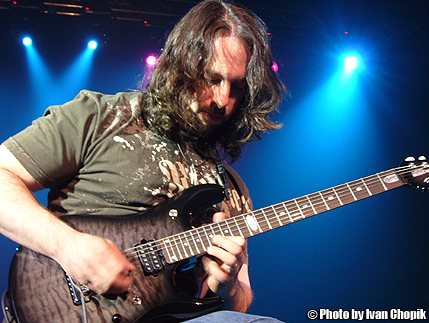 JP: The label that we were on (in the end I guess they called themselves Atlantic… it’s all part of the Warner Group) … that was a record deal that we signed as a young band, which lasted many years (from Images and Words in 1992 to Octavarium in 2005) and it’s something we probably should not have signed.
JP: The label that we were on (in the end I guess they called themselves Atlantic… it’s all part of the Warner Group) … that was a record deal that we signed as a young band, which lasted many years (from Images and Words in 1992 to Octavarium in 2005) and it’s something we probably should not have signed.
So even though they were a big label, there was not a big financial leeway. Eventually we gathered enough power to renegotiate certain aspects, but actually getting out of that label and starting new we found ourselves in a way better bargaining position and really had the advantage of getting what we were looking for, regardless of the size of the label. It’s basically being in the position we are currently in, all of our history, fan base, and our worldwide record sales, and everything else that really put us in a powerful position to get the right deal.
IC: Has Dream Theater found themselves recouping their advances for the last few records? And in general, what do you see as the greatest source of income for the band? Is it royalties or live performance and touring?
JP: We actually do really well with recouping. We recoup really quickly, and that is always great. There is always a pipeline of income that way. Thankfully, like I said, it’s something that happens relatively quickly. I think for us the royalties are ok, and I think if you were plastered all over the radio and you were selling multiple-platinum, you probably would feel that financially a little bit more.
For us, there are many other ways – we’re obviously a live touring band, and our tour income and merchandise income are things that are huge for us as well. But the publishing and that aspect, royalties, is certainly something that’s steady and has been great. It keeps the machine running and we are all thankfully able to prosper and so we are very humbled by that and grateful for that.
IC: What was it like coming back to Berklee College of Music for the filming of the Score DVD – revisiting the halls you once walked?
JP: That was actually really cool. It was something I was happy that I got the opportunity to do. It’s probably something I would not have done had we not planned it for the Score DVD. It was a cool opportunity to take advantage of. It certainly brought back some memories and we saw how some things changed and how some things didn’t change at all. Unfortunately we did not get to go see the dorm area, which would have been fun, seeing where we used to hang out and live.
You know, the thing for all of us, John [Myung, Bass], Mike [Portnoy, Drums] and I, [is] coming full circle. When we went there [Berklee] we were all 17-18 years old, looking up to all our musical idols. When we went there I got a definite feeling from a large number of the students that our presence as a band, not only in the Berklee community but also in the musical scene, definitely felt solidified. It was a good feeling to come back to, because that is recognition as a musician. Being put in that position is really an honor for us.
IC: Did you actually live in the 150 Mass Ave dorms? [Main Berklee Dormitory]
JP: Yeah, I did.
IC: Do you remember where in the dorms?
JP: You know, I don’t remember exactly. John Myung and I roomed together – we had a really small room, I think they were literally bunk beds. I don’t remember if it was on the 8th floor maybe? You know Mike is the one with the elephant memory, he would probably remember the exact room number.
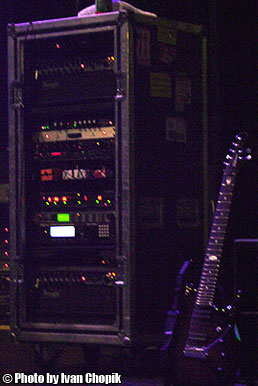
John’s G3 ’07 Rig
IC: Let’s talk a bit about your guitar rig. It’s known to be constantly expanding and changing, but it seems you’ve come back to a Mark IV [Mesa Boogie] based rig and have stuck with that over the past few years. So, have you found the perfect tone?
JP: You know what, I’m incredibly happy with it, I really am. It keeps surprising me, because that amp has a lot of different things that you can do with it. I had an interesting thing happen over the last few days: Basically, when I run my rig with the Mark IV’s, they are set up so they are kind of wide open, pretty loud, and so that all the features on the amp are being maximized – all the voltage and all the tubes, everything. That’s kind of what I’m used to. That gives you a really powerful, chunky sound with a lot of headroom. You know, it really cuts through…
Last week I made a couple changes where I had taken the amps and cabinets and faced them backstage and kind of mic’ed them up that way, used some features on the amp that cut the voltage, (like a variac), used fewer tubes, and things like that. The funny thing is that it was sounding really good to me because we use in-ear monitors, but a few shows later our soundman came up to me and he was like, “Man, it’s really not the way you used to have it, its lacking a lot of the OOMPH and the power.” So I had to kind of reconfigure and get the cabinets back on stage and set it up, put it back to normal (laughs).
But you know, you sometimes have to experience change and you have to try these experiments to realize what you do like and what works – that is part of the process. We just had sound check not too long ago, and I’m pumped that it sounds awesome. It really is a powerful amp that not only is heavy and chunky, but the lead sounds are sweet and they really sing.
IC: I want to talk about your personal goals nowadays, specifically as a guitar player. Is there a particular area in your playing that you are still working on?
JP: There are always areas that I’m working on. I think, in general, as a concept for me, (being that we are on tour, which is obviously performance intensive, which is based on being able to play the music live), my biggest challenge is finding the right energy, the right state of mind, the right presence, and the right physical space live, to be able to execute all that stuff the way it was intended, you know?
And that’s the biggest challenge for me, it really is. Especially as we write more material and our catalogue gets deeper and deeper and we are pulling out songs, and the songs are long, and the concerts are long… You know, we are all perfectionists, but we are human. You want to be able to pull this stuff off exactly the way it is on the album or the way you hear it in your head.
To me, that is something I’m constantly working on – what’s the perfect balance to be able to do that? Is it a lot of pre-show warming up? Is it NO pre-show warming up? Is it more mental or is it stretching? It’s something I talk about a lot with other guitarists and with other musicians. Jordan Rudess and I talk about it almost on a daily basis. So if I had to answer that question accurately that would be it – working on the ability to consistently perform our music up to my standards.
IC: Which is your favorite song to play live? Which do you find is the most challenging song to play live?
JP: More recently there are songs that have been my favorites like: “The Dark Eternal Night” which is a lot of fun to play live – it’s a great heavy 7 string song; “In the Presence of Enemies” is also a lot of fun to play live, because the song is very dramatic.
It’s very movie-ish and it kind of spans a lot of different thematic levels and musical levels. So you have the ability to play very sensitively in that song, very soaring and melodic and at the same time play some ripping shredding stuff, some heavy stuff. So that makes for a really fun song – it never gets boring.
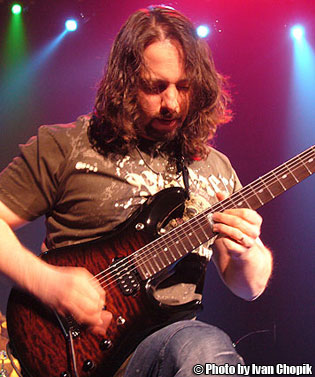 As far as what’s the most difficult song – I don’t think for me there is a particular song that is most difficult, but it could be a certain section within a song, a challenging part or something like that… It’s not that thewhole song is hard to play, it’s that there might be a solo or certain unison line with the keyboard, or whatever… something that is a little tricky to play within the song.
As far as what’s the most difficult song – I don’t think for me there is a particular song that is most difficult, but it could be a certain section within a song, a challenging part or something like that… It’s not that thewhole song is hard to play, it’s that there might be a solo or certain unison line with the keyboard, or whatever… something that is a little tricky to play within the song.
IC: I think I can speak on the behalf of your forum [www.petrucciforum.com] that the “Glass Prison” arpeggios are right up there!
JP: Yeah, they are up there! That’s a funny thing, because here is the balance with that song: its very riff oriented (it’s like a riff workout that song), the song is long, it’s 7 string and you are riffing the whole time, just picking the whole time, so you need a lot of stamina… And I think to get the focus to go from that riff style and then snap into that clear arpeggiated rhythmic style is totally a challenge. It’s definitely a challenge for me to do and I’ve experimented with different techniques on how to do that and basically figured out like three different ways of playing that part.
The funny thing is that Jordan jokes with me that it was a keyboard line, and I come off stage and I’m like, “Ah, man, I didn’t nail that part like I wanted…” and he is like, “Well, it was your choice to play it! When we were writing the song you heard that line and you wanted to play it.” He is actually playing that line during the second verse in that song, behind the vocals, and I remember saying to him, “Yeah, it would be really cool if I played that on the guitar… as a foreshadow to that part.” Sometimes you get yourself into those pickles.
There is another instance in the song called “Blind Faith,” which has another thing that Jordan wrote which is like impossible to play on the guitar. Also, that song is played on a baritone, which makes it even more impossible to play. But lately we have been pulling it off together – it’s satisfying when it happens.
IC: The “Acid Rain” unisons must be up there as well, with that…
JP: Yeah, definitely… I haven’t heard those in a while, so they might just scare me when I turn that on.
IC: So, can we expect your kids to become the sickest shredders ever known to mankind when they grow up?
JP: [Laughs] You know, you would think, both their mother and father are guitar players… all my kids are very musical, they are extremely musical and they all play… my son plays sax and piano, my daughters both play piano, one plays flute, and they all fool around with guitar. None of them have dived in full force on guitar, and I don’t know if they will, but there are certainly enough guitars in the house and enough instruction if they want to. My wife and I both have given them lessons here and there but they seem right now to be drawn more to piano and other band instruments.
IC: Do you expect them to go to Berklee?
JP: I don’t know… it’s a funny thing because in my family I wasn’t pushed into music, and it was something that I gravitated to myself. I want to give them that same opportunity. If it’s something that becomes a passion of theirs that they want to follow through, then that’s great. It’s certainly something all around their lives – they come on tour with me and they have been in the studio, and they know way more than most kids about the world of professional music. If it’s something they want to do, then I will be behind it.
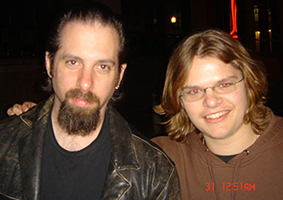
Ivan Chopik with John Petrucci in 2006
IC: Do you have any advice for aspiring musicians here at Berklee and elsewhere?
JP: One of the good things about Berklee is that there are so many musicians, so many performances that you get to see on any given day… I would say to take advantage of that. That was one of the great things I got out of going to Berklee – going to see all different types of people play, different recitals and concerts, taking advantage of the music library and the musical resources there.
People ask me all the time, “do you still practice, do you still learn?” I’m like “of course!” I haven’t changed my philosophy – I might be a bit older then I was when I went to Berklee at 17, but my attitude about music, guitar, and learning is still the same. There is so much out there – so many great players, so much great music to be heard, and so many great things to learn. You can take whatever instrument it is as far as you want to go, you just have to go out there and look for it.





